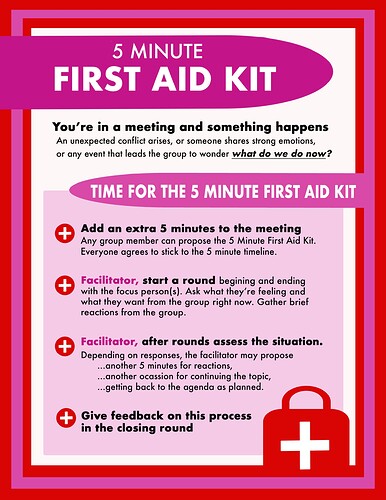Recently while facilitating a meeting, something unexpected happened that left me rattled (emergency: fawn trapped in a fence!). Afterward (the fawn was freed and is now, I hope, happily grazing in a fenceless meadow) I wished I had something like a first aid kit to bring down off the wall…
So here is an effort at that first aid kit! It’s intended for those big, unexpected, moments in meetings when we are feeling overwhelmed and aren’t sure what to do.
Here are some Q&A details:
When do we use the 5 Minute First Aid Kit?
Consider using the 5 Minute First Aid Kit when something unusual or upsetting
happens in a meeting. Examples include someone expressing strong emotions and/or sharing
significant news, or an argument between meeting members. During unsettling or confusing events the facilitator may wonder what to do next. The 5 Minute First Aid Kit offers a structured response.
Who proposes using the 5 Minute First Aid Kit?
Any member of the group can propose it, including the facilitator. The proposal is treated like
any other consent proposal where people consent or object, and the group aims to integrate objections. Someone might say something like “I propose we bring out the 5 Minute First Aid Kit and use the next 5 minutes to talk about what just happened.” The facilitator then asks for a “thumbs up”
consent process. By consenting, the group is agreeing to extend the meeting by 5 minutes and using them to address the outstanding issue.
How does the 5 Minute First Aid Kit work?
The facilitator asks the focus person/people if they’d like to answer these two questions;
1) What are you feeling, and 2) What do you want from the group?
The focus person/people may then respond within the time frame. With time remaining, the facilitator can ask for responses from the rest of the group. When the 5 minutes are up, depending on the needs of the group, the facilitator may propose that…
- The group return to the meeting agenda
- The group spend an additional x minutes processing
- The issue be revisited on a specific date, in a specific way
(e.g., during or before the next meeting, with the whole group or particular people)
Useful tips for the facilitator
- Designate a timekeeper and set a timer for 5 minutes.
- Invite each group member to remain conscious of the plan to keep to the time.
- Review with the group that everyone is responsible for their own feelings and that each
person makes decisions for themselves (i.e., we don’t try to make it for them). - During the closing round asks group members to share their experience during
the 5 Minute First Aid Kit. What worked well? What could have been better?
Use feedback to improve the process.
If you have any thoughts on this I would love to hear them.
The hope is to share the 5 Minute First Aid Kit with our community’s work circles, suggesting they have a bright red, easily found link to the document at the top of their meeting agendas…and what about a surprise 5 Minute First Aid Kit practice run, like a fire drill? Good to be prepared for the unexpected! ![]()
